A program called ‘Decreasing consumption of sugar-sweetened beverages and Raising tap water consumption through Interventions based on Nutrition and sustainability for Kids’ (DRINK) aims to encourage Belgian schoolchildren to adopt healthier habits. The study protocol is published in BioMed Central’s journal Trials.
Study Protocol: Decreasing consumption of sugar-sweetened beverages and Raising tap water consumption through Interventions based on Nutrition and sustainability for Kids: study protocol of the “DRINK” cluster randomised controlled trial. Image Credit: urbans / Shutterstock
Background
Health experts and policymakers have been concerned about children consuming sugary drinks and other sweetened beverages (SB) for decades. They are also not drinking enough water. Consuming SB instead of water can cause weight gain, obesity, and tooth decay. Dehydration is also a serious problem. Belgium is among the top five consumers of SB in European countries, making it a public health issue.
Schools are a good place for students to learn healthier habits that encourage them to reduce SB consumption and increase their water intake. However, many schools have vending machines that stock SB or do not have functioning water taps. Parents may also send their children to school with SB.
“Careful evaluation of health promotion at school is crucial. Indeed, school is identified as an interesting health-related intervention setting, but the efficiency of health promotion at school has not been sufficiently evaluated so far.”
To address this issue, researchers of the present study decided to involve parents and schools in the DRINK program. Replacing SB with tap water has several benefits. It is healthier for the children and less expensive for their parents. Using tap water will also generate less waste.
About the study
The DRINK program has been implemented as a cluster randomized controlled trial (cRCT) in 168 schools in Belgium. The schools were randomized to one of four treatments: (1) no treatment (control), (2) sustainability-based interventions focused on the environmental impact of water waste and bottled water, (3) nutrition-based interventions focused on the health benefits of water and the harm caused by sugar, and (4) both types of interventions. All the students in a school received the same treatment.
Informative documents (leaflets and posters) were distributed to schools, students, and parents. DRINK also instituted water breaks and discussion meetings in schools in groups (2)-(4). The program provided reusable bottles and glasses only to students who needed them. Researchers asked teachers in control schools to continue their then-ongoing programs on sustainability and nutrition.
DRINK began implementation in the 2020-2021 school year when the first round of data was collected. At the beginning of the program, the students were 8-10 years old (Grades 3-5). The study design required that students be followed up for two school years, and schools without students in 3rd-6th grades and those having under 11 students by grade were not selected for the study for organizational reasons. The participants were asked to fill out questionnaires marking their daily consumption of SB with stickers. These booklets were designed to be easy for the children to use and understand.
Along with the student questionnaires, school staff were interviewed about the implementation of DRINK at their institution and any inconveniences they faced. Parents also provided information on their occupation, household diet, living conditions, and sustainable behaviors through self-completed questionnaires.
There was an intermediate survey in 2021/2022; the final round of surveys took place in 2022/2023 when the students were 10-12 years old. The same information was collected in each wave of data collection. The researchers hope to complete their analysis and present findings by the end of 2024.
The study outcomes are average daily SB consumption (in mL) and the proportion of children consuming SB daily. It will assess whether the DRINK program successfully reduced SB consumption and increased water intake in Belgian schoolchildren. The researchers will also see whether nutrition-based or sustainability-based actions are more effective.
To examine the impact of nutrition-based interventions, students from groups (1) and (3) will be compared with those in (2) and (4). Comparing (2) and (3) with (1) and (4) will provide the effect of the sustainability-based interventions. To see if the two interventions interact, researchers will compare groups (3) and (4) with (1) and (2). The analysis will consider factors such as the socio-economic status of the child’s school and family that could affect program impact. The results will also allow researchers to identify the most cost-effective intervention.
Discussion
DRINK is the first study to systematically evaluate a school-based health intervention over a long period (2 years). The program has benefited from the guidance of experts in public health, epidemiology, psychology, and economics. Feedback was also taken from school administrators. If effective, the program can be implemented across the country.
The researchers hope their work will improve the delivery of health interventions by communicating their findings with various health promotion programs and other stakeholders in Belgium. They will also present their results to the staff at the participating schools. The DRINK program is a promising attempt to instill healthy behaviors in school students and their families.
